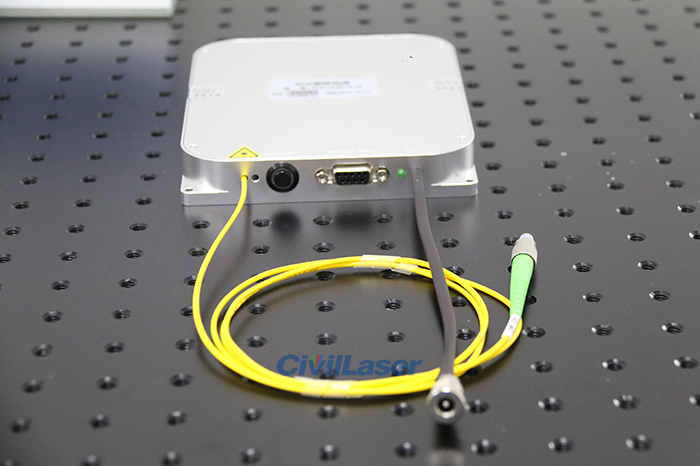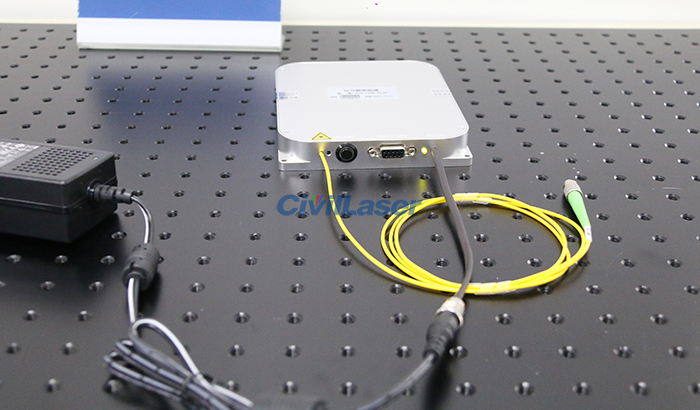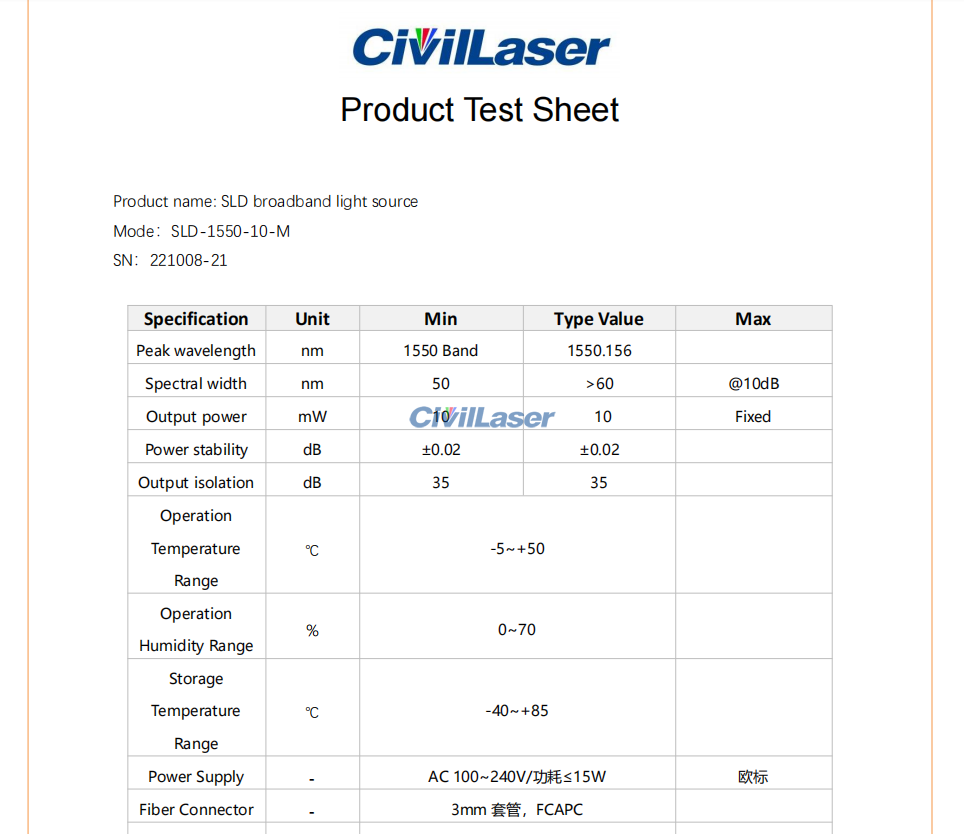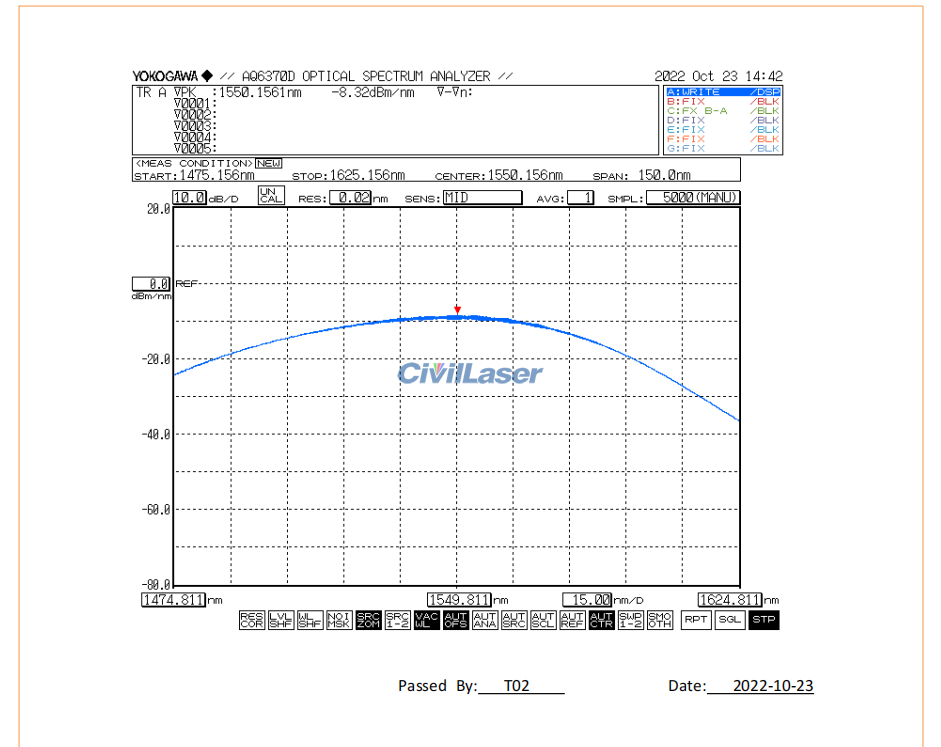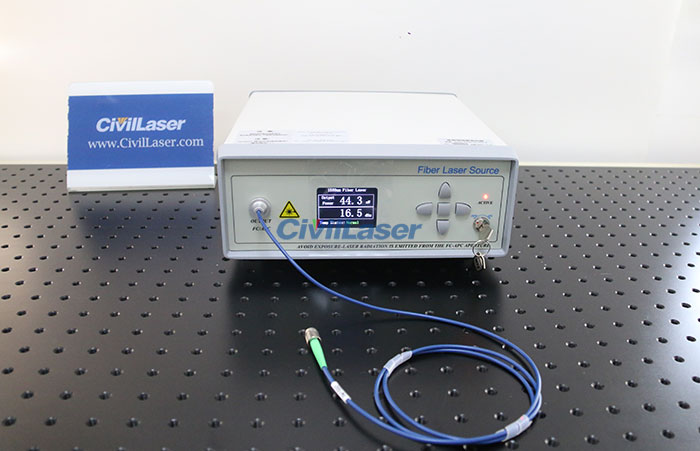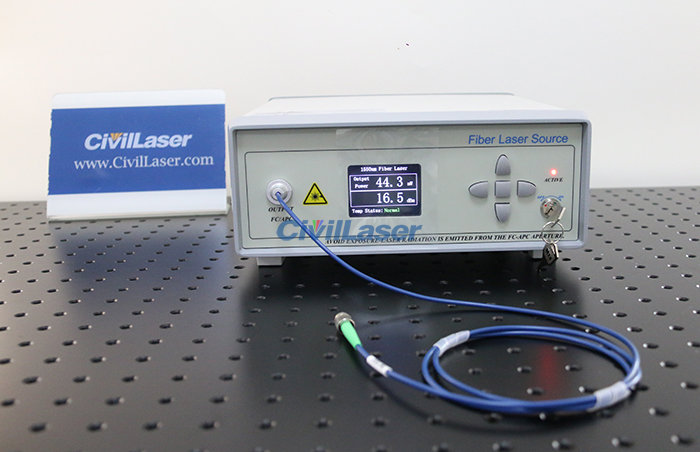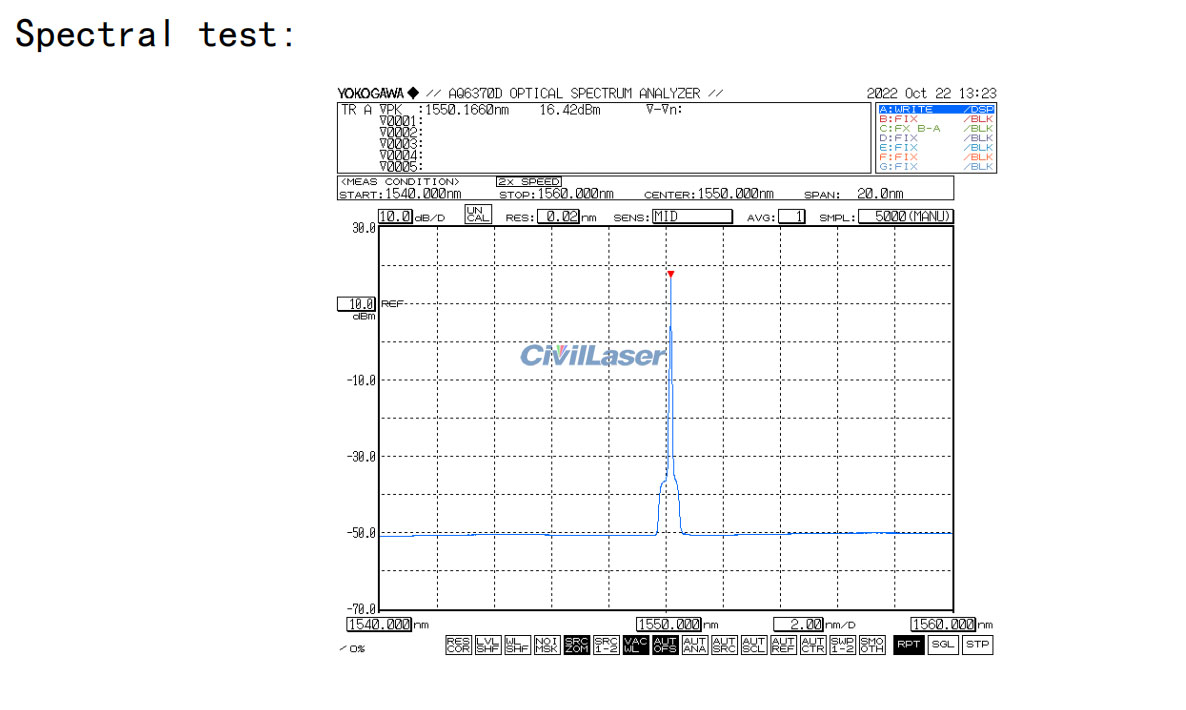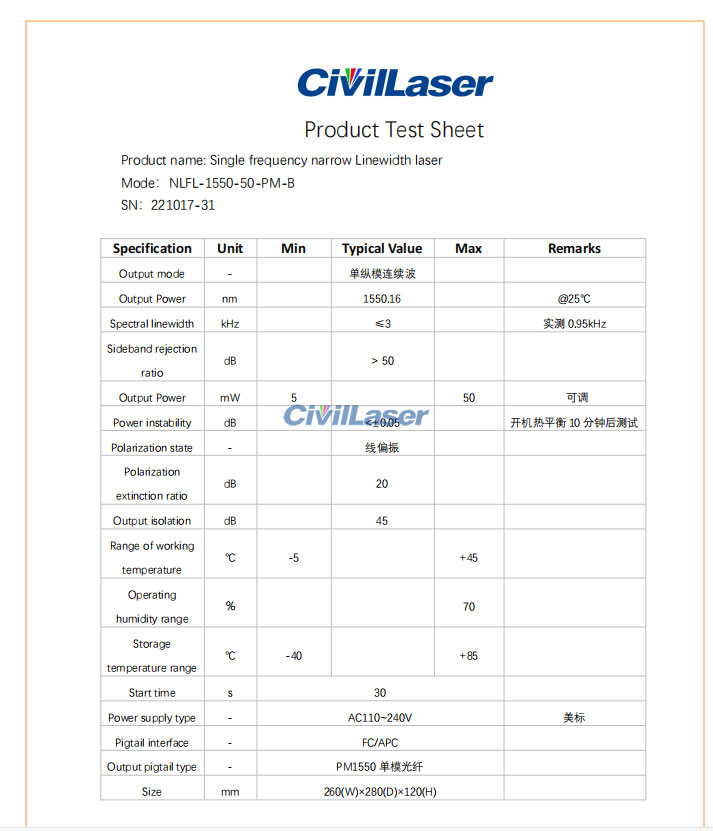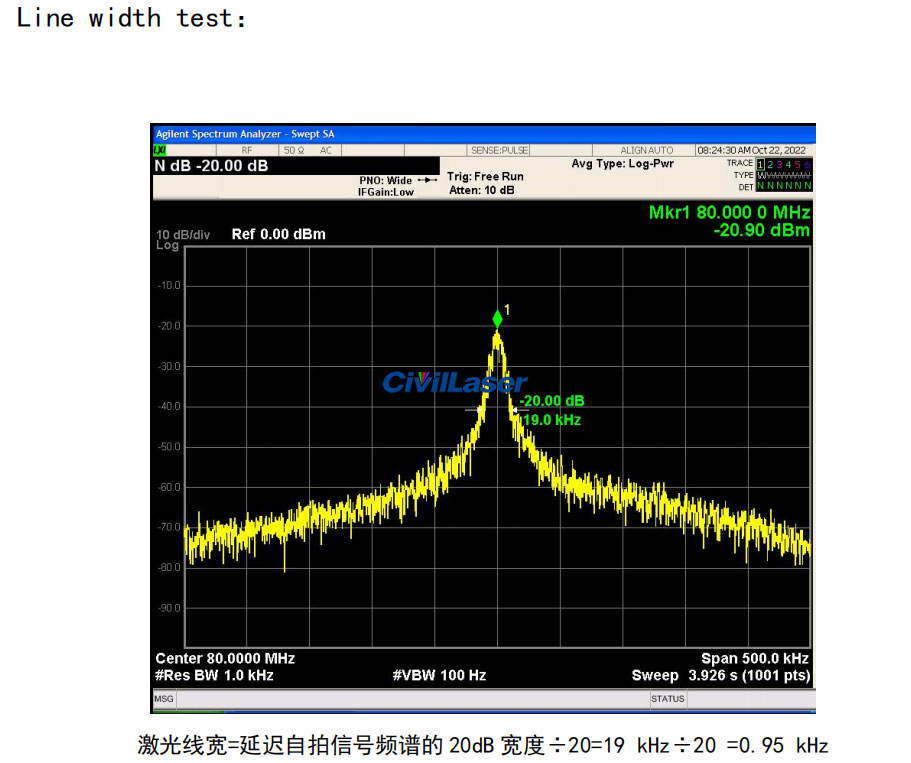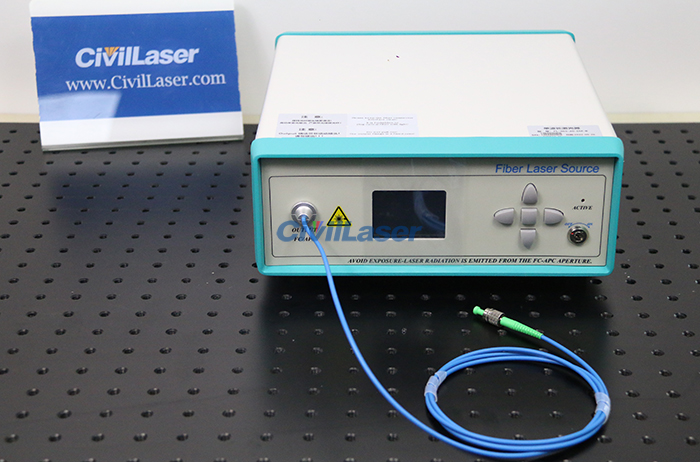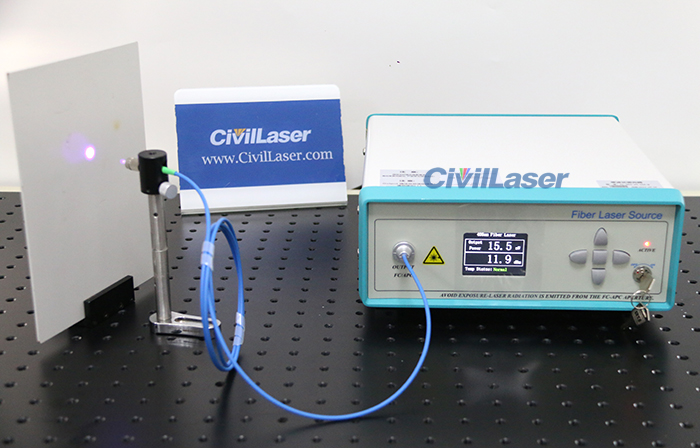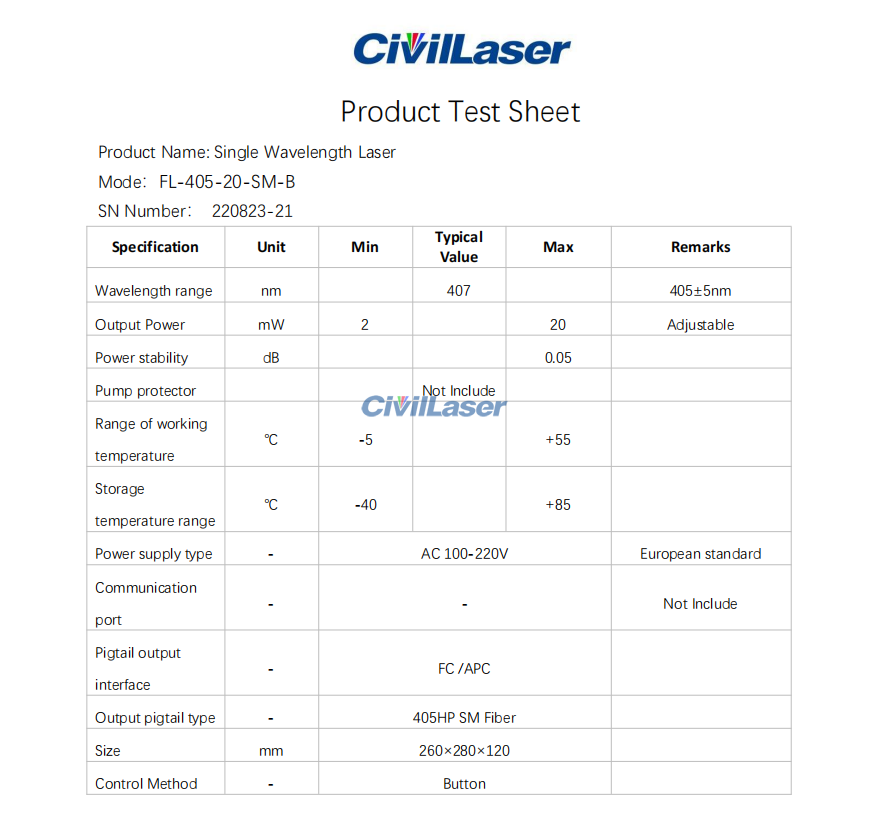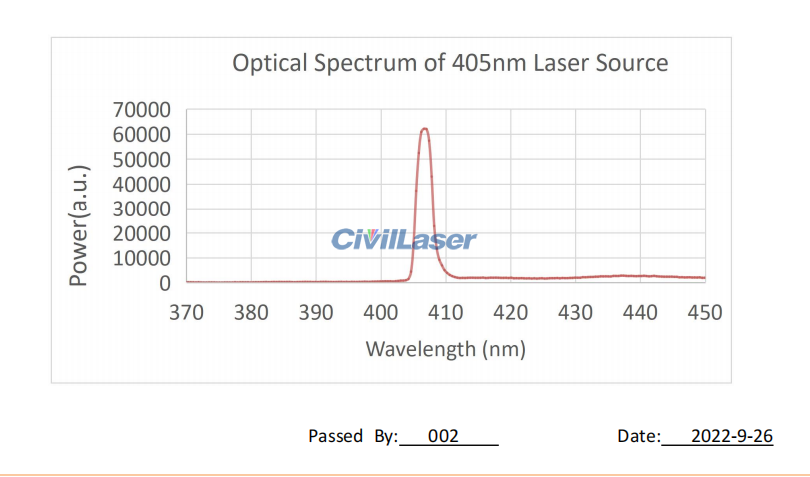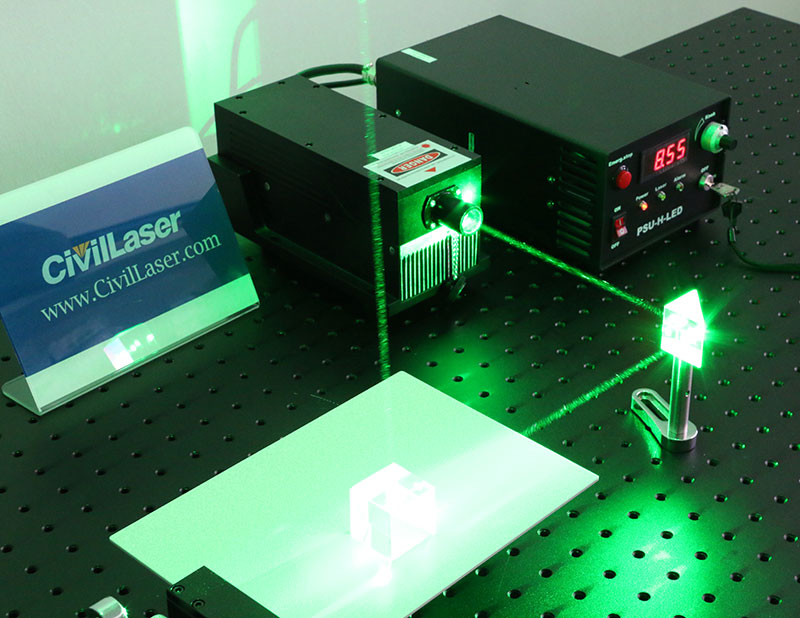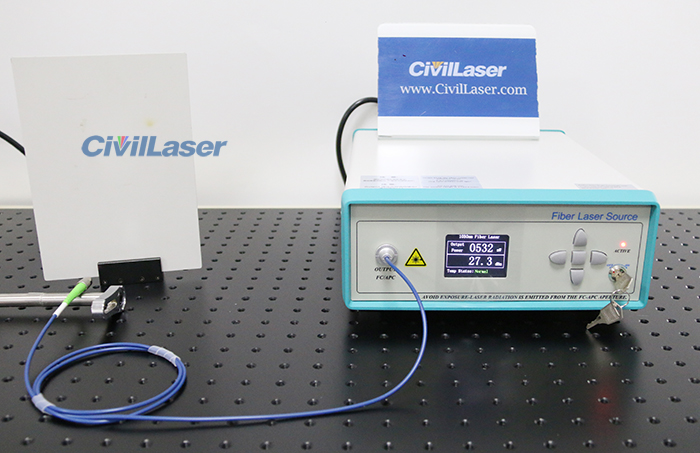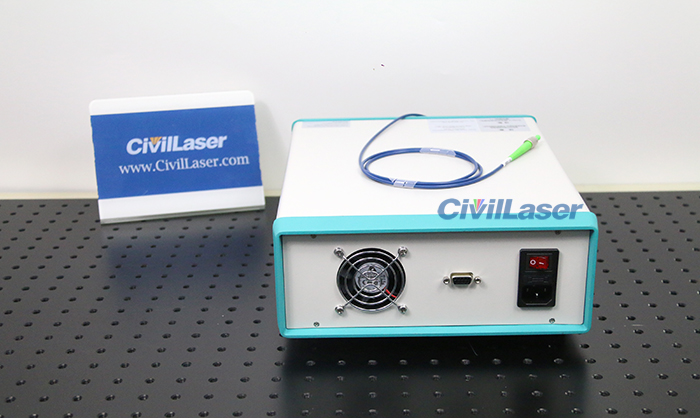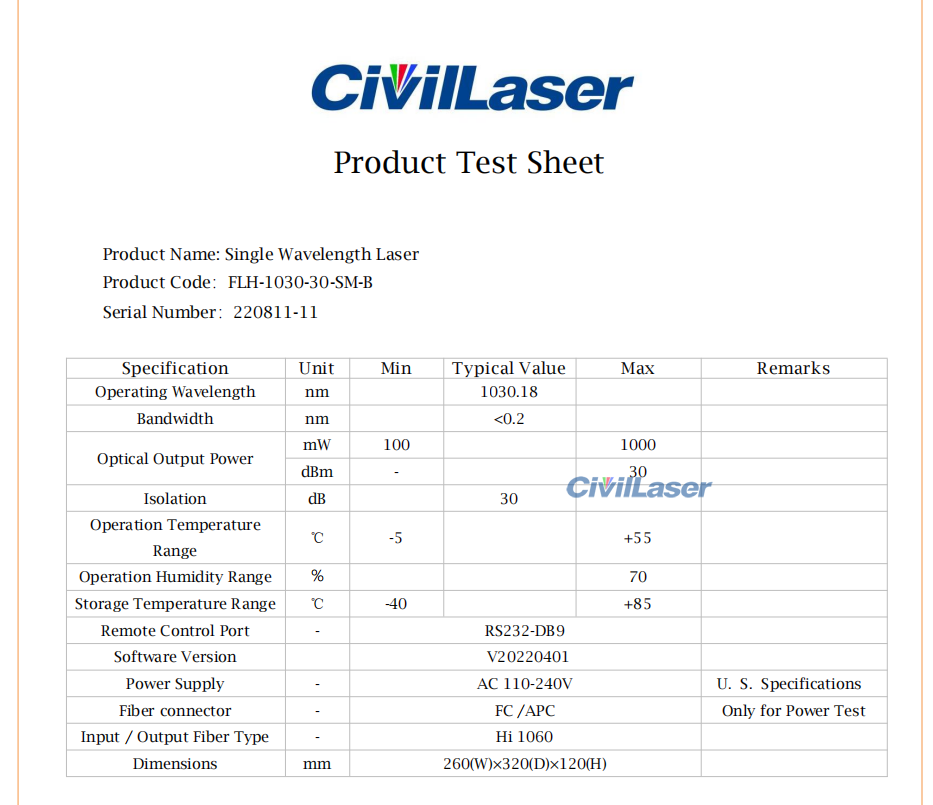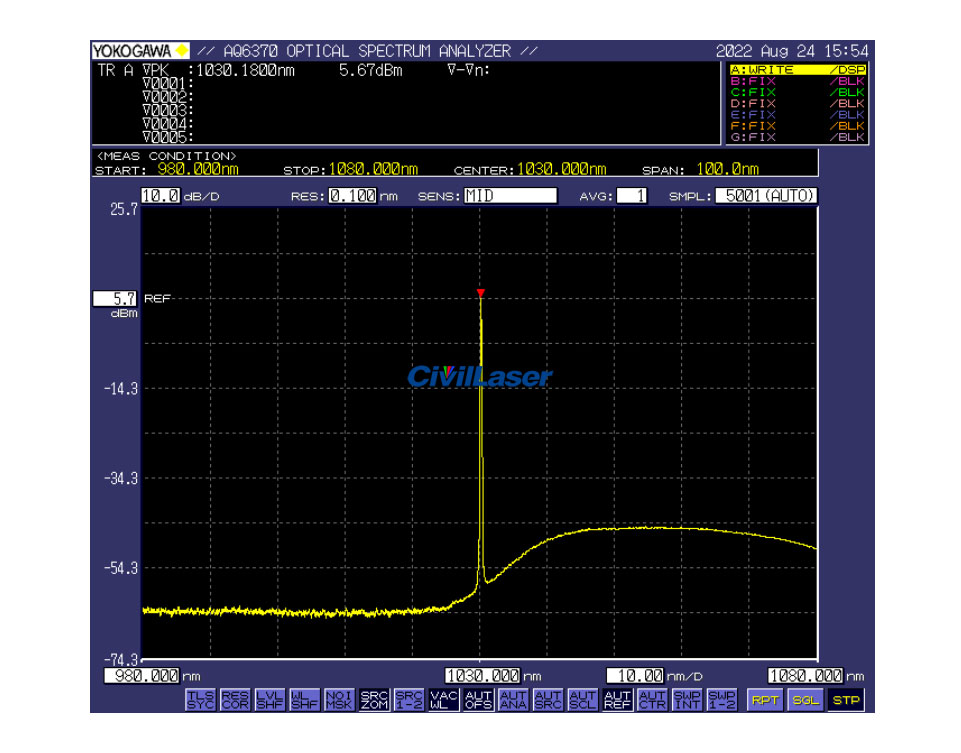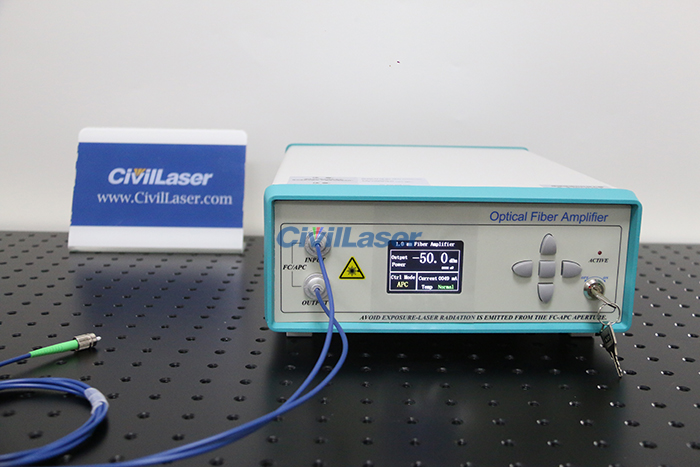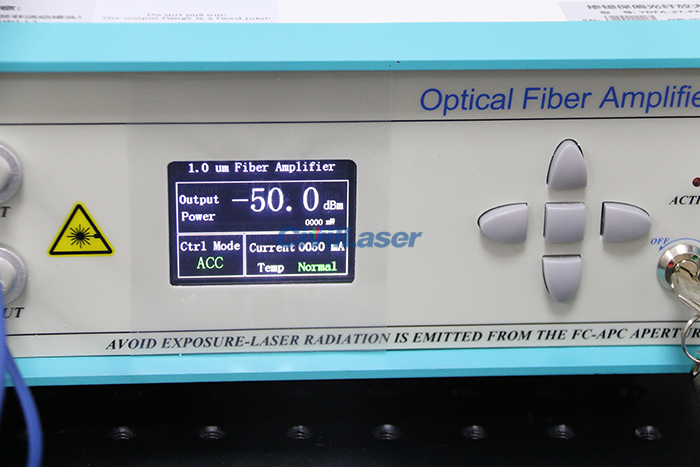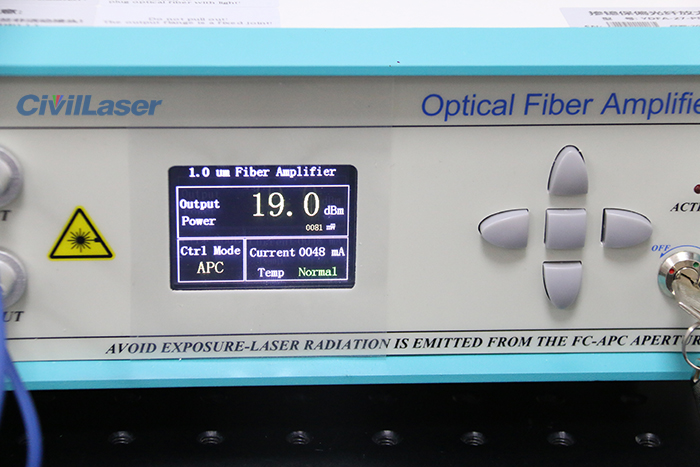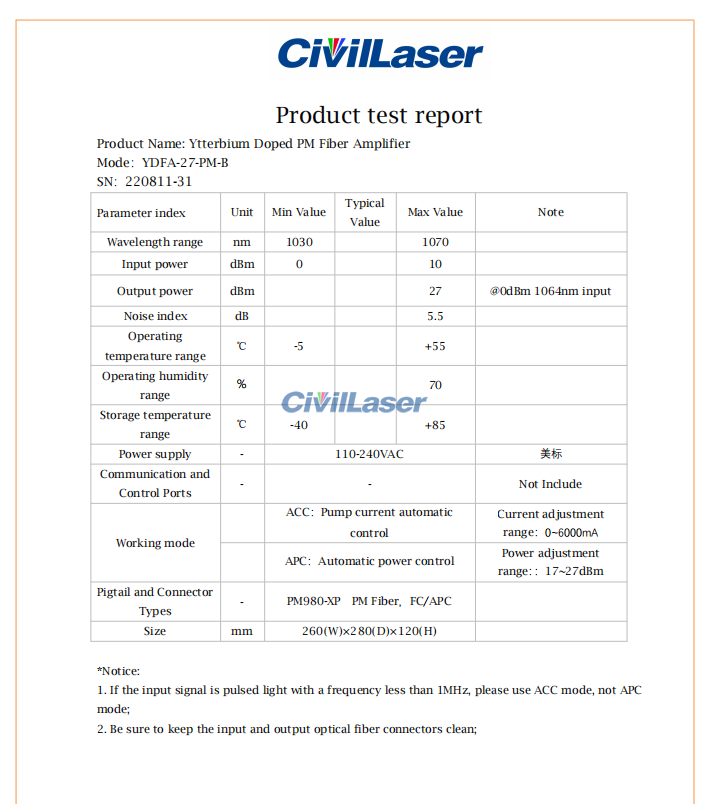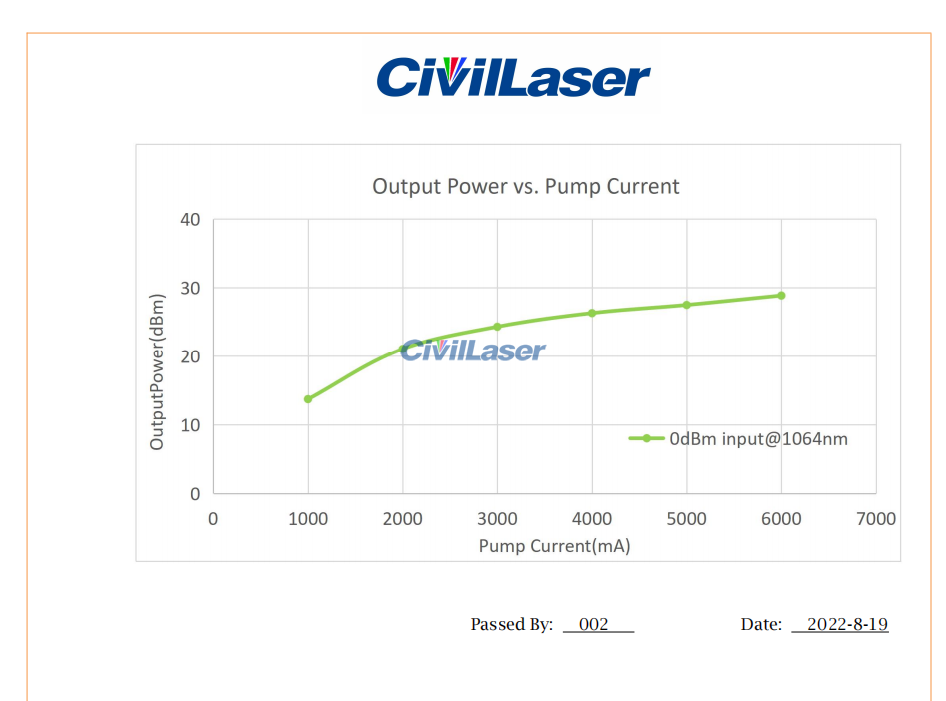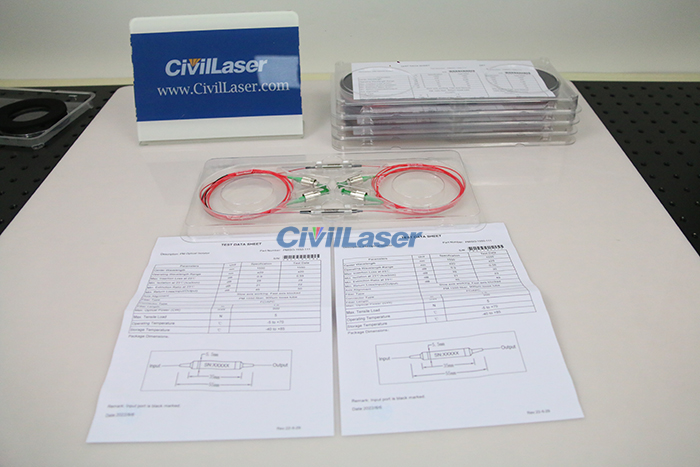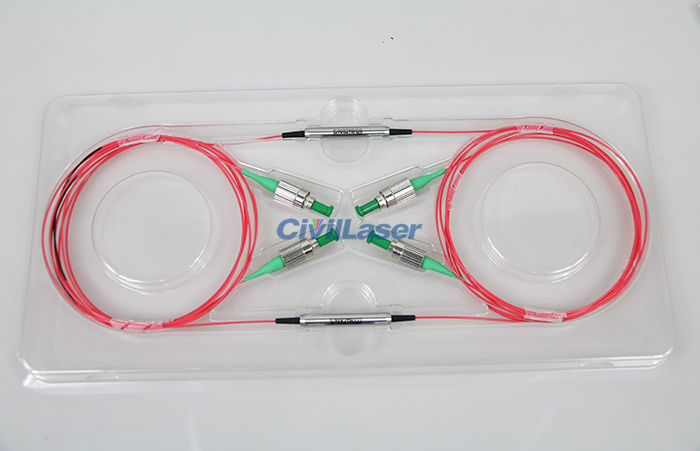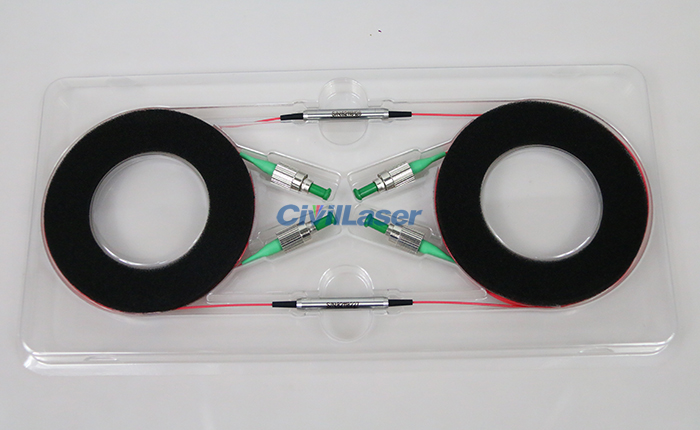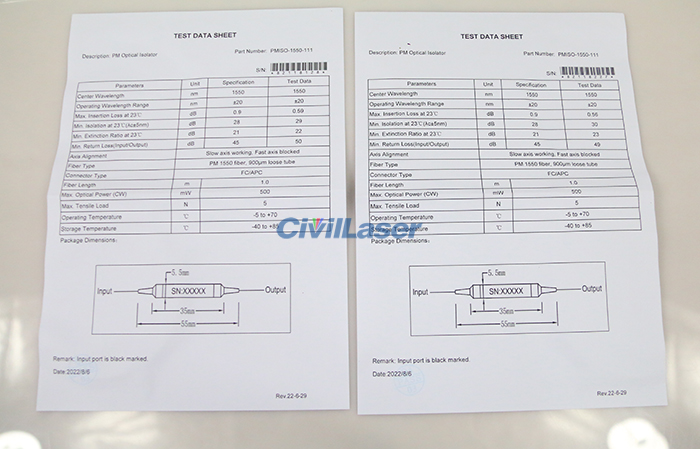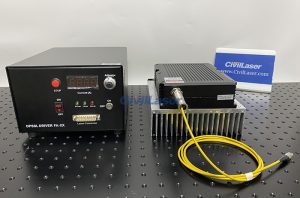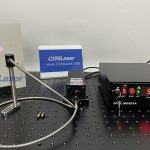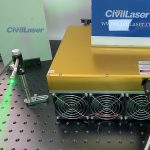Category Archives: Civil Laser
SM Fiber Laser System SLD Broadband Light Source
SLD broadband light source adopts super radiant semiconductor diode light-emitting chip, which outputs broadband spectrum with low coherence degree and high output optical power spectral density. The operating wavelength can be selected from O, S, C, L and other bands, suitable for optical OCT, optical fiber sensing applications.
This is a 1550nm 10mW SLD light source of module type. It is equipped with a single mode fiber. It can be customized power adjustable version. When the power adjustment is selected, the power adjustment is controlled through the RS232 serial communication. The standard version is a fixed power mode, the light source is controlled by the button. We tested it with an infrared photosensitive film, and we could see a light spot.
The test data report and spectrum of 1550nm light source.
Ultra Narrow Linewidth 3kHz PM Fiber Laser Source
This is a 1550nm 50mW PM fiber laser source. The output power can be adjusted, and the adjustment accuracy is 0.1mW. This is a narrow linewidth laser with a spectral bandwidth of less 3kHz. Customizable software control function, using RS232 communication serial port. Standard version with button control, control switch, adjust the power size. PM1550 polarization maintaining fiber is installed, and SM single-mode fiber can also be customized. Let’s check it now.
Single frequency narrow linewidth fiber laser adopts rare earth doped fiber DFB laser cavity structure, output single longitudinal mode laser with wavelength of 1550nm, spectral linewidth is less than 3kHz, output spectral side mode suppression ratio exceeds 60dB, can provide module or desktop package, is distributed Ideal laser source for applications such as sensing.
The test report of 1550nm 50mW 3kHz PM fiber laser.
This is the line width test, the actual measurement is 0.95kHz.
532nm 1W DPSS TEM00 Lab Laser
It is 532nm DPSS laser source. This laser source can be controlled by software. The connection of the laser and the PC software, using the RS232 communication protocol. The laser supports two modes of operation CW/Modulation, and an external signal input is required when switching to Modulation. Here is the free space output, and it is also possible to customize the fiber-coupled laser. Let’s check it now.
Software operation.
Click the [Open COM] button to connect the control circuit on the laser.
Multiple laser operating parameters can be viewed/set in the software.
As a special reminder, it is necessary to set a maximum working current parameter according to the current laser first, so as to avoid the current of the later regulation being too high and damaging the laser.
405nm SM Fiber Laser Controlled by Button Operational Demo
This is a video about a desktop laser with button control of the laser output. we demonstrate with a 405nm 20mW SM fiber laser. It is controlled by buttons by default, and it can also be controlled by software. The laser is equipped with single-mode fiber output, and polarization-maintaining fiber output can also be customized. It has LCD display, real-time display of current power. The power is adjustable, and the adjustment accuracy is 0.1mW. Let’s check it now.
Adjust the laser output power:
Press the middle square button to enter setup mode.
The left and right arrow buttons are used to select the digital position to be adjusted.
The up and down arrow buttons are used to adjust the size of the numbers.
Finally press the middle square button to save and exit the settings.
When the key is turned ON, the Active indicator lights up, indicating that there is laser output.
This laser adopts semiconductor laser chip, and the professionally designed drive and temperature control circuit temperature control ensures the safe operation of the laser, stable output power and spectrum, and excellent spot quality (TEM00 mode).
The test data report and optical spectrum of 405nm fiber laser source.
532nm DPSS Laser VS 520nm Semiconductor Laser
532nm and 520nm are both common green lasers in the laboratory. The difference is that one is a diode pumped solid state(DPSS) laser and the other is a semiconductor laser.
532nm is a commonly used wavelength in dpss laser. DPSS lasers have advantages in compactness and efficiency over other types, and high power DPSS have replaced ion lasers and flashlamp-pumped lasers in many scientific applications, and are now appearing commonly in green and other color laser pointers.
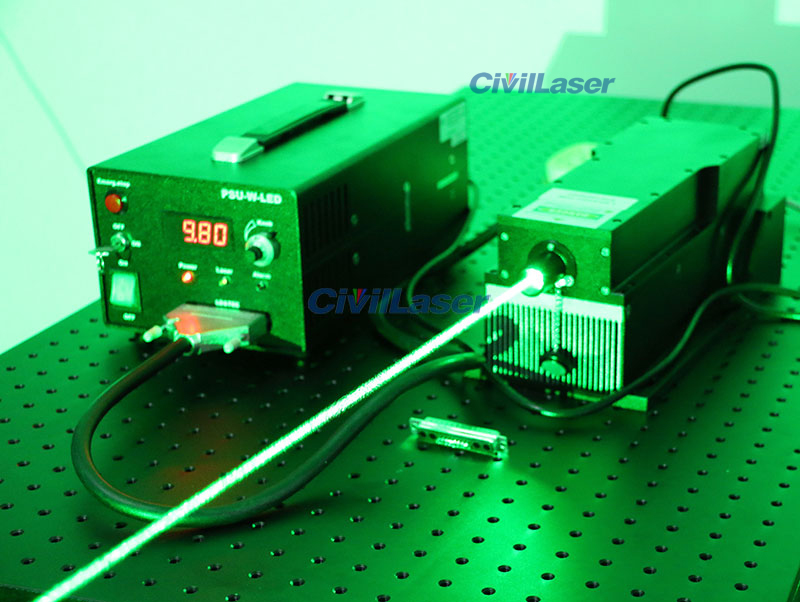
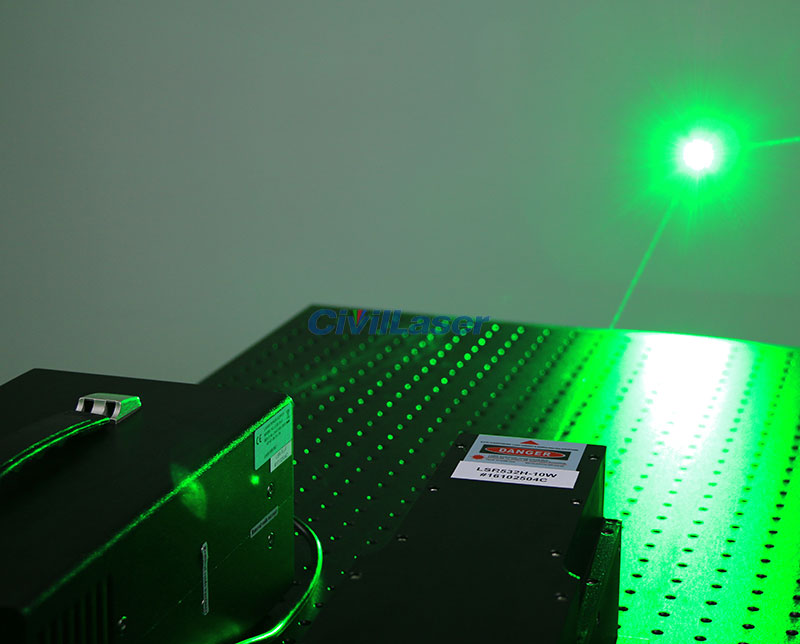
The choice of the semiconductor material determines the wavelength of the emitted beam, which in today’s laser diodes range from infra-red to the UV spectrum. Laser diodes are the most common type of lasers produced, with a wide range of uses that include fiber optic communications, barcode readers, laser pointers, CD/DVD/Blu-ray disc reading/recording, laser printing, laser scanning and light beam illumination. With the use of a phosphor like that found on white LEDs, Laser diodes can be used for general illumination.
520nm 12W semiconductor laser.
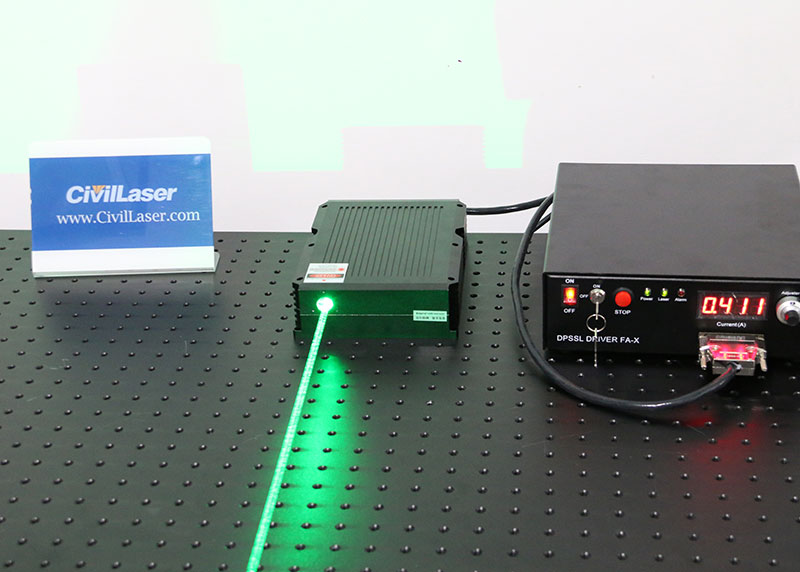
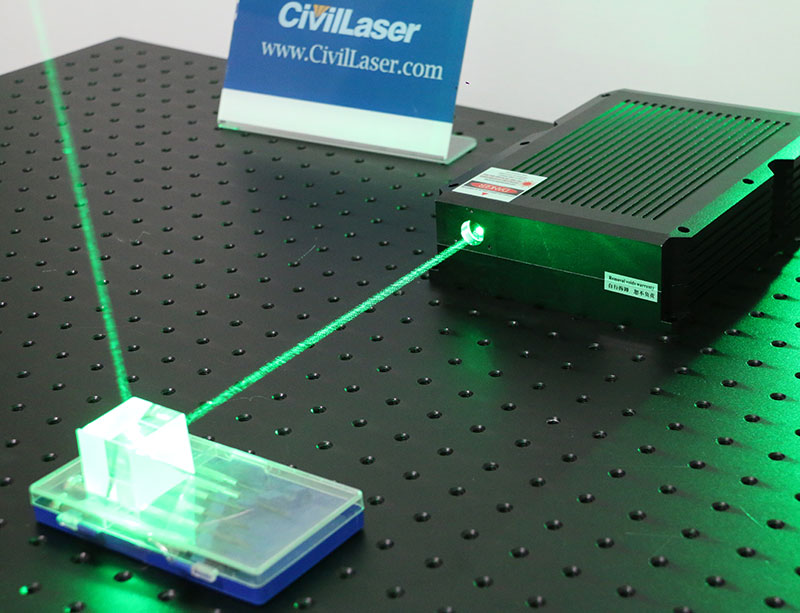
Custom fiber coupling is available for either 532nm dpss laser or 520nm semiconductor lasers. Please go to CivilLaser for details.
690nm SM TEM00 Laser Operation Video
Today we’re going to talk about a single-mode red laser — 690nm 30mW TEM00 laser. Its output power can be adjusted from 0 to 30mW. The working voltage is AC 90~240V, supports wide range voltage. It support CW/Modulation two working modes. This is a single transverse film laser. Let’s check it now.
The test data report of 690nm 30mW semiconductor laser:
1030nm 30dBm 1W SM Fiber Laser Source Benchtop
This laser adopts all-fiber laser technology, professionally designed and driven temperature control circuit and control to ensure the safe operation of the laser and stable laser output power and spectrum. It is suitable as a seed laser for higher power laser systems, and can also be used for production testing of optical fiber devices. It can be provided in benchtop or modular packaging.
It is a single-mode fiber copuled laser at 1030nm 1000mW. The laser output power is adjustable from 100mW~1000mW, and the adjustment accuracy is 1mW. It can be adjusted by buttons. Customizable software control function, connect with computer via RS232-USB. Configured with single-mode fiber Hi1060, and can also customize polarization-maintaining fiber output.
1030nm is invisible light, we use infrared photosensitive film to observe the light spot.
The Test Data Sheet & Spectrum at 1030nm, spectral bandwidth <0.2nm.
Ytterbium-doped Fiber Amplifier PM Fiber Laser Source Benchtop
The following is a demonstration of the operation of the desktop YDFA button control. Let’s check it now.
This is a Ytterbium Doped Fiber Amplifier with PM Fiber. The working wavelength is 1030nm~1070nm. It supports ACC and APC working modes. We can switch the APC/ACC working mode with the left and right buttons. At the same time, this machine also supports power regulation. In the APC working mode, press the up and down arrow buttons to adjust the power.
Ytterbium-doped fiber amplifier (YDFA) generates gain by pumping ytterbium-doped fiber with a semiconductor laser, and is used to amplify laser signals in the 1030~1100nm band. PM980 polarization-maintaining fiber output, the output power is continuously adjustable, and has the advantages of high gain and low noise. The desktop YDFA is convenient for experimental operation, and the user can adjust the pump current and output power through the buttons on the front panel. A more compact modular YDFA is also available, which is convenient for users’ system integration. Both desktop YDFA and modular YDFA can support PC software control and serial port command control.
1550nm Single Stage PM Optic Isolator
Today we are going to explain the 1550nm single-stage fiber isolator. 1310nm PM fiber isolator is optional. The default fiber is PM1550 fiber. The FC/APC interface is used by default, other interfaces can be customized according to your needs. Let’s check it now.
The Polarization Maintaining Isolator is characterized with low insertion loss, high isolation, high return loss, high extinction ratio and excellent environmental stability and reliability. It is ideal for polarization maintaining fiber amplifers, fiber lasers, high speed communication systems and instrumentation applications.
Test report for 1550nm polarization maintaining fiber isolator.
405nm Semiconductor Laser 12W Powerful Laser Source
This is a 405nm 12W blue-violet laser System. It is high power solid state laser with a heat sink installed at the bottom of the laser module. The radiator is aluminum with 2 cooling fans. Configuring a heat sink can effectively extend the continuous working time of the laser. There are 3 working modes on the back of the laser power supply: CW/TTL/Analog. The output power of the 0~12W laser can be adjusted by the Adjustor rotary button.
The 405nm 12W laser needs a collection of multiple LDs to have such a high power, so the spot mode is also multimode.
The 405nm laser is a blue-violet laser, which is close to ultraviolet invisible light. The 12W laser is not very dazzling to the naked eye. But the energy is very strong, please wear laser safety glasses when operating.
CivilLaser have mature production technology, stable quality and short production cycle.







